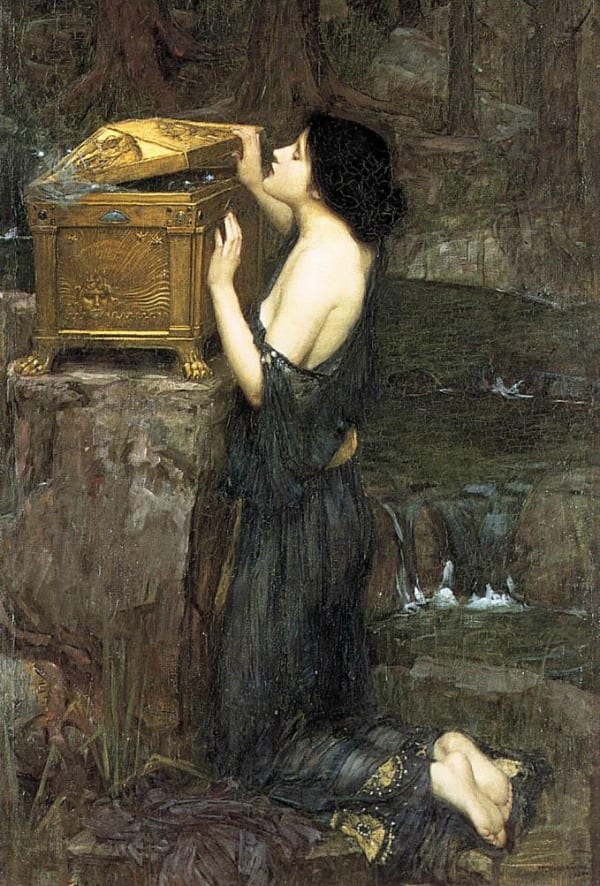The legacy of Pandora’s box
The legacy of Pandora’s box
The legacy of Pandora’s box
-
Hannah
-
Hannah

No doubt you’ve heard the term ‘opening a Pandora’s box’ before. It’s used to express that an action that may seem small or inconsequential may in fact create lots of unforeseeable difficulties and heartache.
‘Be careful, Oriel,’ I could tell the heroine of my new novel, Aphrodite’s Tears. ‘Taking that archaeology posting on the Greek island of Helios; working for that proud, autocratic man, Damian; digging about not only in the ancient past, but in the history of this island and its family and in your own romantic history – you’d be opening a Pandora’s box…’
In other words: be warned!
The warning tone of ‘opening a Pandora’s box’ is implicit and easily understood. But do you know what the expression actually means? Who exactly was this Pandora?
Aphrodite’s Tears was a hint: as my new novel is inspired by the stories of Greek mythology, so are many of our modern references: Herculean task, Trojan horse, Achilles’ heel, Midas touch – and Pandora’s box.
According to Greek mythology, Pandora was the very first mortal woman. Her name means ‘all-giving’, and yet she was never meant to be beneficent.
It was the Titan Prometheus who had stirred the waters, when he created man, shaping him from clay, and then stealing for man the fire of the heavens, so that he may become civilised. The Greek god Zeus was furious by this theft. He sentenced Prometheus to eternal torment, binding him to a rock where he would be attacked daily by the personification of Zeus as an eagle. Mankind, meanwhile, needed something to balance out the huge power they had been given, Zeus decided, and that took the form of Pandora. He commanded Hephaestus and Athena to create the first woman out of the earth. She was bestowed with gifts from all the gods to make her a talented and beautiful creature – but deceitful, treacherous, evil; capable of causing the downfall of man.
According to the poet Hesiod, Zeus gave Pandora a jar (not, in fact, a box; that is based on a mistranslation of ancient Greek texts) and gave her strict instructions not to open it. Of course, curiosity compelled her just to take a little peek – and as she opened it, she unleashed on humankind all of the evils that have since plagued our world: pain, sickness, toil, death.
There are obvious similarities between Pandora and Eve of the Book of Genesis. Both are the first women; both are given one ‘divine prohibition’, as it is known; both succumb to temptation – and both are then held accountable for a whole world of suffering.
But unlike Eve, there is a final twist to Pandora’s story that leaves a glimmer of light in a darkened world. Pandora resealed her jar just in time to prevent everything inside escaping. So writes Hesiod:
Only Hope was left within her unbreakable house,
she remained under the lip of the jar, and did not
fly away. Before [she could], Pandora replaced the
lid of the jar. This was the will of aegis-bearing
Zeus the Cloudgatherer.
Pandora, then, is not left hopeless. Humanity cannot connect to the hope – it is locked away. But they know at least that it exists, and that, it seems, was the one spark of compassion in Zeus’s plan.
Pandora’s story has been passed down from generation to generation to serve as a warning not to let curiosity lead you astray, and to think carefully of the potential consequences of your actions. Over the years, it has inspired everything from poetry and music to paintings and jewellery.
I will leave you with my favourite Pandora-inspired works, both from the nineteenth century: a poem by Dante Gabriel Rossetti (1869), and a painting by John William Waterhouse (1896).
Pandora (For A Picture)
WHAT of the end, Pandora? Was it thine,
The deed that set these fiery pinions free?
Ah! wherefore did the Olympian consistory
In its own likeness make thee half divine?
Was it that Juno’s brow might stand a sign
For ever? and the mien of Pallas be
A deadly thing? and that all men might see
In Venus’ eyes the gaze of Proserpine?
What of the end? These beat their wings at will,
The ill-born things, the good things turned to ill,—
Powers of the impassioned hours prohibited.
Aye, clench the casket now! Whither they go
Thou mayst not dare to think: nor canst thou know
If Hope still pent there be alive or dead.

In that painting is the inspiration of treasure hunters through the ages.
I didn’t know the entire story of Pandora. Thanks for sharing.
Absolutely! If only she knew what was inside…